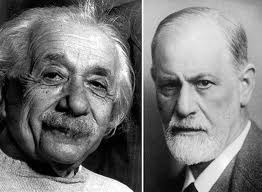Is War What Makes Us Human?
I was thinking about this ever since reading Walter Isaacson’s biography of Albert Einstein during October. Riding through the Nevada desert in late October on my way back from Las Vegas, I listened to the chapter chronicling Einstein’s activities in support of pacifism during the 1920s and early 1930s. (Einstein’s views about the need for war changed after Nazi’s rise to power. Like any good scientist, his views changed when the facts changed.)Albert Einstein wrote a letter to Sigmund Freud asking a seemingly unanswerable question: could humanity everforsake its tendency to engage in war, violence and destruction?
I greatly admire your passion to ascertain the truth--a passion that has come to dominateall else in your thinking. You have shown with irresistible lucidity how inseparably theaggressive and destructive instincts are bound up in the human psyche with those of loveand the lust for life. At the same time, your convincing arguments make manifest yourdeep devotion to the great goal of the internal and external liberation of man from theevils of war. This was the profound hope of all those who have been revered as moral andspiritual leaders beyond the limits of their own time and country, from Jesus to Goetheand Kant.
Freud, like Einstein, was an ardent supporter of the international anti-war movement following the First World War. Still, the legendary psychologist was skeptical that mankind as a species could ever be extricated from his warlike tendencies. Humans are animals, Freud reasoned, and within the animal kingdom competition for resources and rewards are typically settled through conflict and subjugation by force.
Conflicts of interest between man and man are resolved, in principle, by the recourse to violence. It is the same in the animal kingdom, from which man cannot claim exclusion...The upshot of these observations, as bearing on the subject in hand, is that there is no likelihood of our being able to suppress humanity's aggressive tendencies.
The best hope, Freud suggested, might be to create a world that “brings out the significant resemblances between men calls into play this feeling of community, identification, whereon is founded, in large measure, the whole edifice of human society.”Mankind’s combined talents in the areas of conflict and community led our species to dominate the planet. Territorial aggression was an important earlier evolutionary trait in homo sapiens, as it enabled humans to acquire and pertain land and resources for an expanding population. The trait that complements this aggression that other species lacked was our ability to “socialize” or bond around ideas and efforts on behalf of a larger community, pursuing objectives beyond our own selfish needs and gratification.In his book The Social Conquest ofEarth, the biologist Edmund O. Wilson, talks about these twin forces in our DNA, referring to them as the “selfish” alleles and the “altruistic” alleles. He suggests, in language somewhat reminiscent of Freud’s letter to Einstein, that to extract these selfish alleles from our essence would make us something less than human. Maybe closer, Wilson writes, to ants, who are the only other species that exhibit advance social behavior comparable to humans. Ants in contrast to humans, however, systematically act in ways that seem self-sacrificing based on their role in the ant colony, as if they were pre-programmed with only “altruistic” alleles that ignore their selfish needs of them or their offspring but serve a larger purpose for the species.Can we renounce violence, selfishness and aggression but still remain human? The question is as puzzling today as it was to Einstein nearly a century ago. I think and hope that humanity can evolve in time, balancing the selfish alleles and the altruistic alleles in a way that assures not only our survival but a more peaceful and prosperous future. One of the things that motivates the writer is the quest to ascertain the true nature of humanity. Journals, essays and works of fiction are created in the Quixotic pursuit of seemingly unanswerable questions about what it is that makes us human.
 The writer toils away like a soldier ant in a vast colony. He is unsure if his exact location or purpose, he is only dimly away of his role in some larger, incomprehensible system. Still, he is powered by some instinctive drive to find meaning, as if participating in a vast, bottomless, evolutionary stew of ponderings and conversations might somehow lead one step closer to resolution of unsolvable problems. Writing, when exercised with a clear mind and heart, has the power to create this feeling of identification and community among people, this feeling that Freud and Einstein hoped could ultimately save us from ourselves.
The writer toils away like a soldier ant in a vast colony. He is unsure if his exact location or purpose, he is only dimly away of his role in some larger, incomprehensible system. Still, he is powered by some instinctive drive to find meaning, as if participating in a vast, bottomless, evolutionary stew of ponderings and conversations might somehow lead one step closer to resolution of unsolvable problems. Writing, when exercised with a clear mind and heart, has the power to create this feeling of identification and community among people, this feeling that Freud and Einstein hoped could ultimately save us from ourselves.
Published on December 30, 2012 12:56
No comments have been added yet.



